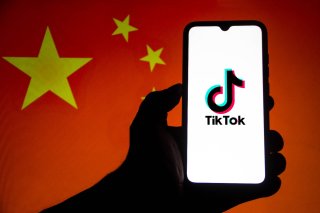Rachel Chiu

In mid-March, the White House issued a major ultimatum to TikTok’s parent company, ByteDance: divest from the popular social media app or risk fighting a national ban. It took the Biden administration too long to take action, but it is now following its predecessor’s lead and reinvigorating the pressure campaign that began in late 2020. Given TikTok’s record of censorship, legitimate espionage concerns, and the platform’s legal obligation to comply with an authoritarian regime that has, for decades, committed egregious human rights violations, it’s about time that Washington clamped down on the controversial company.
TikTok became a household name during the early days of the pandemic and has not waned in its global popularity, with its current user base exceeding one billion. The video-sharing platform has even prompted legacy competitors, like Instagram and YouTube, to roll out features that mimic the short-form content models that TikTok provides. In many ways, the app is an exemplar of innovation organically displacing dominant incumbents—the powerful “Big Tech”—in a market that many lawmakers believe has insurmountable barriers for new competitors. TikTok provides a conduit for free expression, a source of income for content creators, and a means by which users can find levity and entertainment. These are valuable societal benefits. Yet they do not negate nor supplant the company’s inseparable ties to the Chinese government.
As Representative Cathy McMorris Rodgers said during this week’s TikTok hearing, “ByteDance is beholden to the [Chinese Communist Party], and ByteDance and TikTok are one and the same.” Her statement is accurate: Article Seven of China’s National Intelligence Law, enacted in 2017, states that “any organization or citizen shall support, assist, and cooperate with state intelligence work according to the law.” This responsibility can manifest in a variety of forms. The state can require TikTok to grant access to user data, circulate disinformation, or modify the recommendation algorithms that filter content.
Organizations and citizens must also protect “any state intelligence work secrets of which they are aware.” TikTok’s CEO claims that the government has never asked for assistance with espionage, and that the company would not comply with such requests if asked. Given these legal obligations, however, such promises are cold comfort.
Despite the CEO’s comments, evidence suggests that TikTok is heeding the state’s orders. In 2020, Elizabeth Kanter, a TikTok executive, admitted during a British parliamentary hearing that the company censored videos about the humanitarian crisis in Xinjiang. Kanter stated that there were “some incidents where content was not allowed on the platform, specifically with regard to the Uyghur situation.”
The Chinese government exercises this discrete yet influential form of control, especially in the technology sector. It has recently moved to acquire, by compulsion, “golden shares” in private firms like Alibaba and Tencent, giving officials an even greater foothold in the business world while bolstering its power and surveillance capabilities. These realities should inform how the U.S. government perceives TikTok as a national security threat.
In 2019, the social media platform promised to stop accessing clipboard content on users’ devices. Several months later, Apple’s privacy transparency feature revealed the practice continued unabated. TikTok has been fined for collecting information from minors and sued for harvesting personal data, all without consent. As a general rule, private companies should not need to earn political favor in order to operate in the United States. But compounded with China’s propensity to involve itself with its businesses and engage in espionage—let’s not forget the spy balloon—this unwillingness to respect privacy is problematic.
Other countries are attuned to this threat as well. The United States, in addition to the United Kingdom, the European Union, New Zealand, and Canada, have restricted government employees from downloading TikTok on their work devices.
Banning TikTok or forcing divestment will not give the United States an upper hand in the ongoing conflict with China. But it will impede the Chinese government from leveraging a platform that has become ubiquitous in American society.
No comments:
Post a Comment